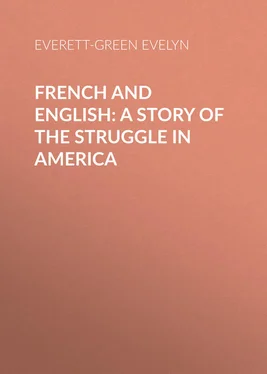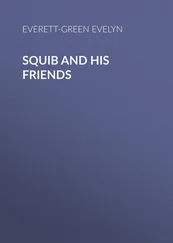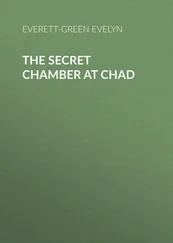Evelyn Everett-Green - French and English - A Story of the Struggle in America
Здесь есть возможность читать онлайн «Evelyn Everett-Green - French and English - A Story of the Struggle in America» — ознакомительный отрывок электронной книги совершенно бесплатно, а после прочтения отрывка купить полную версию. В некоторых случаях можно слушать аудио, скачать через торрент в формате fb2 и присутствует краткое содержание. Жанр: foreign_antique, foreign_prose, на английском языке. Описание произведения, (предисловие) а так же отзывы посетителей доступны на портале библиотеки ЛибКат.
- Название:French and English: A Story of the Struggle in America
- Автор:
- Жанр:
- Год:неизвестен
- ISBN:нет данных
- Рейтинг книги:4 / 5. Голосов: 1
-
Избранное:Добавить в избранное
- Отзывы:
-
Ваша оценка:
- 80
- 1
- 2
- 3
- 4
- 5
French and English: A Story of the Struggle in America: краткое содержание, описание и аннотация
Предлагаем к чтению аннотацию, описание, краткое содержание или предисловие (зависит от того, что написал сам автор книги «French and English: A Story of the Struggle in America»). Если вы не нашли необходимую информацию о книге — напишите в комментариях, мы постараемся отыскать её.
French and English: A Story of the Struggle in America — читать онлайн ознакомительный отрывок
Ниже представлен текст книги, разбитый по страницам. Система сохранения места последней прочитанной страницы, позволяет с удобством читать онлайн бесплатно книгу «French and English: A Story of the Struggle in America», без необходимости каждый раз заново искать на чём Вы остановились. Поставьте закладку, и сможете в любой момент перейти на страницу, на которой закончили чтение.
Интервал:
Закладка:
Jack and the maidservant assisted Susanna at the stove, and a few minutes passed before they entered the supper room, where the company had assembled. When they did so, the girl was surprised to note that her mother was standing between two tall strangers, one of whom had his arm about her, and that she was weeping silently yet bitterly.
Susanna put down her dishes on the table and crept to her father's side.
"What is the matter?" she asked timidly.
"Matter enough to bring tears to all our eyes-ay, tears of blood!" answered Ashley sternly. "These two men are your mother's brothers, who arrived today-just a short while back-as I hoped with pleasant tidings. Now have we learned a different tale. Their old father and Charles's wife and children have been brutally murdered by Indians, and he himself escaped as by a miracle. We have been telling the tale to the Assembly this very afternoon. Ah, it would have moved hearts of stone to hear Charles's words! I pray Heaven that something may soon be done. It is fearful to think of the sufferings which our inaction is causing to our settlers in the west!"
"It is a shame-a disgrace!" exclaimed Jack hotly, and then he turned his glance upon the two other men who were seated at the table, taking in the whole scene in silence.
Both wore the look of travellers; both were tanned by exposure, and were clad in stained and curious garments, such as betokened the life of the wilderness. Jack was instantly and keenly interested. He himself would willingly have been a backwoodsman had he been able to adopt that adventurous life.
Ashley saw the look he bent upon the travellers, and he made them known to one another.
"These friends have travelled far from the lands of the south, and have been friends in need to our kinsmen yonder. Fritz Neville and Julian Dautray are their names.
"Susanna, set food before them. Your mother will not be able to think of aught just now. We must let her have her cry out before we trouble her."
The rest of the party seated themselves, whilst in the recess by the window Hannah stood between the brothers she had parted from ten years ago, listening to their tale, and weeping as she listened.
Ashley turned to his two guests, who were eating with appetite from the well-filled platters placed before them, and he began to speak as though taking up a theme which had lately been dropped.
"It is no wonder that you are perplexed by what you hear and see in this city. I will seek to make the point at issue as clear to you as it may be. You have doubtless heard of the Penn family, from whom this colony takes its name. Much we owe to our founder-his wisdom, liberality, and enlightenment; but his sons are hated here. They are absent in England, but they are the proprietaries of vast tracts of land, and it is with regard to these lands that the troubles in the Assembly arise. The proprietaries are regarded as renegades from the faith; for the Assembly here is Quaker almost to a man. They hate the feudalism of the tenure of the proprietaries, and they are resolved to tax these lands, although they will not defend them, and although no income is at present derived from them."
"Have they the power to do so?" asked Julian.
"Not without the consent of the Governor. That is where the whole trouble lies. And the Governor has no power to grant them leave to tax the proprietary lands. Not only so, but he is expressly forbidden by the terms of his commission to permit this taxation. But the Assembly will not yield the point, nor will they consent to furnish means for the defence of the colony until this point is conceded. That is where the deadlock comes in. The Governor cannot yield; his powers do not permit it. The Assembly will not yield. They hate the thought of war, and seem glad to shelter themselves behind this quibble. For a while many of us, their friends, although not exactly at one with them in all things, stood by them and upheld them; but we are fast losing patience now. When it comes to having our peaceful settlers barbarously murdered, and our western border desolated and encroached upon; when it becomes known that this is the doing of jealous France, not of the Indians themselves, then it is time to take a wider outlook. Let the question of the proprietary lands stand over till another time; the question may then be settled at a less price than is being paid for it now, when every month's delay costs us the lives of helpless women and children, and when humanity herself is crying aloud in our streets."
Ashley, although he had long been on most friendly terms with the Quaker population of the town, was not by faith a Quaker, and was growing impatient with the Assembly and its stubborn policy of resistance. He felt that his old friend Franklin should know better, and show a wider spirit. He had acted with promptness and patriotism earlier in the year, when Braddock's luckless expedition had applied to him for help. But in this warfare he was sternly resolved on the victory over the Governor, and at this moment it seemed as though all Philadelphia was much more eager to achieve this than to defend the borders of the colony.
Hitherto the danger had not appeared pressing to the eastern part of the colony. They were in no danger from Indian raids, and they had small pity for their brethren on the western frontier. Between them and the encroaching Indians lay a population, mostly German, that acted like a buffer state to them; and notwithstanding that every post brought in urgent appeals for help, they passed the time in wrangling with the Governor, in drawing up bills professing to be framed to meet the emergency, but each one of them containing the clause through which the Governor was forced to draw his pen.
Governor Morris had written off to England stating the exceeding difficulty of his position. His appeals to the Assembly to defend the colony were spirited and manly. He was anxious to join with the other colonies for an organized and united resistance, but this was at present extremely difficult. Others before him had tried the same policy, but it had ended in failure. Petty jealousies did more to hold the colonies apart than a common peril to bind them together. Political and religious strife was always arising. There was nothing to bind them together save a common, though rather cold, allegiance to the English King. Now and again, in moments of imminent peril, they had united for a common object; but they fell apart almost at once. Each had its own pet quarrel with its Governor, which was far more interesting to the people at the moment than anything else.
Julian and Fritz listened in amaze as Ashley, who was a well-informed man and a shrewd observer, put before them, as well as he was able, the state of affairs reigning in Pennsylvania and the sister states.
"I am often ashamed of our policy, of our bickerings, of our tardiness," concluded the good man; "yet for all that there is stuff of the right sort in our people. We have English blood in our veins, and I always maintain that England is bound to be the dominant power in these lands of the west. Let them but send us good leaders and generals from the old country, and I will answer for it that the rising generation of New England will fight and will conquer, and drive the encroaching French back whence they came!"
Chapter 4: An Exciting Struggle
It was an exciting scene. Susanna stood at the window, and gazed eagerly along the street, striving hard to obtain a sight of the seething crowd in the open square.
She could see the tall, haggard form of her Uncle Charles, as she called him. He was standing upon a little platform that his friends had erected for him in front of the Assembly Rooms, and he was speaking aloud to the surging crowd in accents that rang far through the still air, and even reached the ears of the listeners at the open window.
Читать дальшеИнтервал:
Закладка:
Похожие книги на «French and English: A Story of the Struggle in America»
Представляем Вашему вниманию похожие книги на «French and English: A Story of the Struggle in America» списком для выбора. Мы отобрали схожую по названию и смыслу литературу в надежде предоставить читателям больше вариантов отыскать новые, интересные, ещё непрочитанные произведения.
Обсуждение, отзывы о книге «French and English: A Story of the Struggle in America» и просто собственные мнения читателей. Оставьте ваши комментарии, напишите, что Вы думаете о произведении, его смысле или главных героях. Укажите что конкретно понравилось, а что нет, и почему Вы так считаете.












